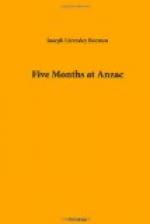The garbage at first was collected in casks, placed in a barge and conveyed out into the bay; it was found, however, that a lot of it drifted back. It reminded one so much of Newcastle and Stockton. The same complaints were made by the men on the right as are put forth by Stockton residents regarding the Newcastle garbage. We, of course, occupied the position of the Newcastle Council, and were just as vehement in our denial of what was a most obvious fact. The situation was exactly the same—only that, instead of dead horses, there were dead mules. Three incinerators were started, enclosures built up with stone, and a fire lighted. This was effective, but gave rise to a very unpleasant smell along the beach. The only time I was shot was from an incinerator; a cartridge had been included in the rubbish and exploded just as I was passing. The bullet gave me a nasty knock on the shin.
It was a fairly common practice among men just arrived to put a cartridge in their fire just to hear the noise. Of course down on the beach it was not usual to hear a rifle fired at close range, and the sound would make everybody look up to “see where the —— that came from.” The discovery of the culprit would bring out a chorus from the working parties: “Give him a popgun, give him a popgun!” “Popgun” was preceded by the usual Australian expletive.
[Illustration: Mules in a Gully.]
[Illustration: Graves of Major Ellis and Lieut.-Col. Braund.]
[Illustration: Wounded being placed on Hospital Ship.]
[Illustration: Stretcher Bearers carrying Col. Cox.]
The water found on the Peninsula was always subjected to careful examination, and, before the troops were allowed to use it notices were placed on each well stating whether the water was to be boiled or if only to be used for washing.
SIMPSON
Everyone knows of Simpson and his donkey. This man belonged to one of the other Ambulances, but he made quite frequent trips backwards and forwards to the trenches, the donkey always carrying a wounded man. Simpson was frequently warned of the danger he ran, for he never stopped, no matter how heavy the firing was. His invariable reply was “My troubles!” The brave chap was killed in the end. His donkey was afterwards taken over by Johnstone, one of our men, who improvised stirrups out of the stretcher-slings, and conveyed many wounded in this manner.
CHURCH SERVICES
No account of the war would be complete without some mention of the good work of the chaplains. They did their work nobly, and gave the greatest assistance to the bearers in getting the wounded down. I came into contact chiefly with those belonging to our own Brigade. Colonel Green, Colonel Wray, and Captain Gillitson; the latter was killed while trying to get one of our men who had been wounded.




